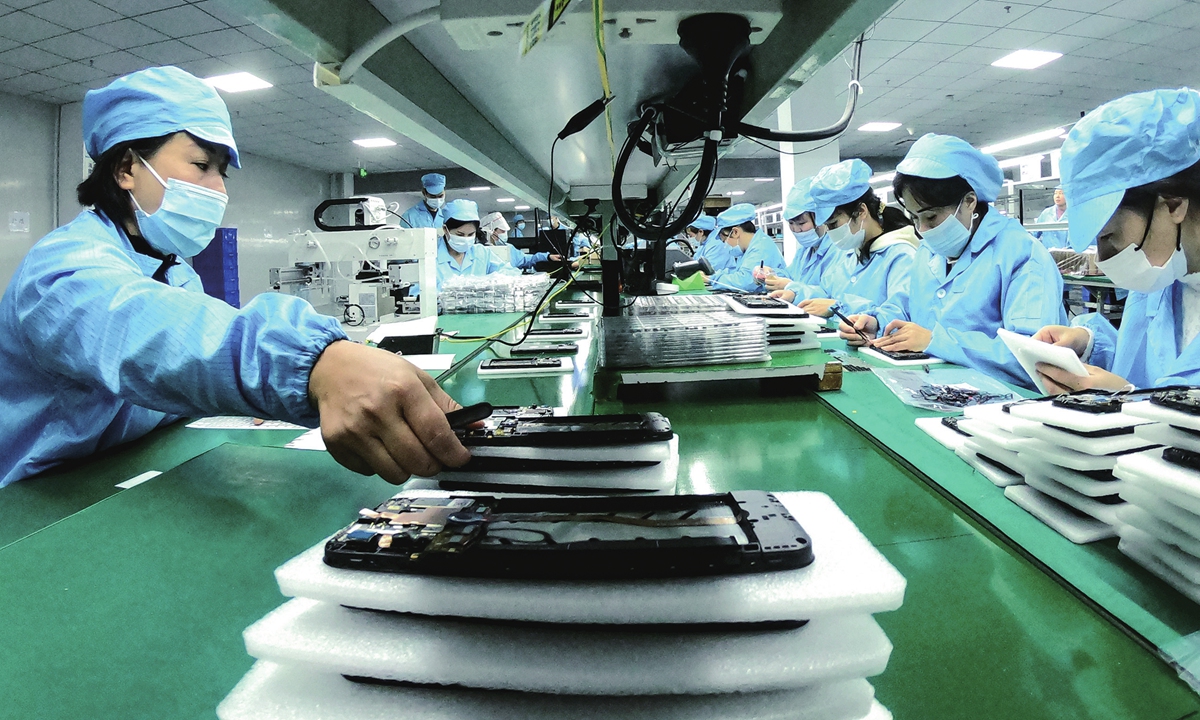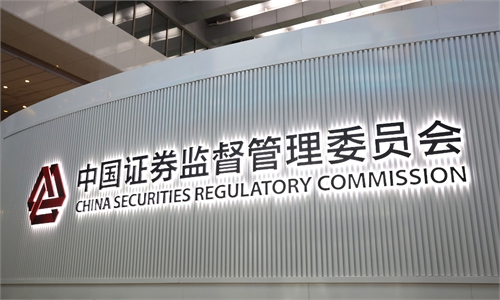
Workers rush to make export orders in a factory in Meishan, Southwest China's Sichuan Province on October 10, 2022. Customs data showed that China's foreign trade totaled 3.71 trillion yuan ($531.64 billion) in August, up 8.6 percent on a yearly basis. Photo: cnsphoto
Right after the conclusion of the 20th National Congress of the Communist Party of China, the country's top economic planner issued a package of comprehensive policy to support and improve the quality of foreign investment in China, with measures including facilitating international travel for key personnel and allowing foreign companies to raise funds on China's stock markets, a move which analysts said shows China's determination in further opening up its market and sharing its growth opportunities with the world.
The steady development of foreign companies in China will not only contribute to the growth of the Chinese economy but also produce a positive push to the world economy, they noted.
China's top economic planner, the National Development and Reform Commission (NDRC), along with five other ministries, issued 15 measures to facilitate the implementation of foreign-invested projects on Tuesday, with emphasis placed on the manufacturing sector.
The measures specify the direction and key tasks in utilizing foreign investment in the current and coming period, according to the NDRC, with the aim of attracting more foreign capital, stabilizing existing foreign investment and improving the quality of foreign investment. It also calls for letting foreign investment boost the high-quality development of the Chinese manufacturing sector so that it further integrates into the global economy.
Bai Ming, deputy director of the international market research institute at the Chinese Academy of International Trade and Economic Cooperation, told the Global Times on Tuesday that as the first policy package related to the country's opening-up policy after the conclusion of the key Party congress, the move signals China's determination in opening up its market to foreign companies and sharing its growth opportunity with more and more foreign companies.
Manufacturing breeds hope
Experts said the emphasis on manufacturing reflects the spirit of the key meeting, which called to upgrade China's manufacturing capacity among other measures to develop real economy.
Yao Jingyuan, a special researcher of the Counselors' Office of the State Council, told the Global Times on Tuesday that high-quality development of Chinese manufacturing needs the participation of foreign companies, and investment in Chinese manufacturing in turn will generate high returns for multinational companies. Investing in China's manufacturing is investing in the future, he noted.
Under current complex economic pressures, investment to manufacturing sector was still able to achieve a growth of 10.1 percent in the first three quarters, underscoring its potential, Yao said. "Manufacturing is set to further gain pace in the fourth quarter while playing an even more important role in the Chinese economy in 2023."
Liu Yuanchun, president of the Shanghai University of Finance and Economics agrees. In a CGTN report on Tuesday, Liu said that manufacturing sector, which posted a growth of 4.1 percent in the third quarter, will breed more opportunities.
Further investment in the manufacturing sector will also amplify the advantages of China's manufacturing power and even create opportunities amid global stagflation, Liu said, noting that investment in infrastructure has reached a relative saturation level while property sector investment continues to slow down.
In terms of boosting foreign investment, the document released on Tuesday calls for "converting the opening-up policy into concrete and tangible foreign-invested projects" and pushing the "fast-tracked implementation of signed projects."
Other measures include the implementation of a negative list approach for foreign investment, ensuring the supply of market factors such as land and trade flow, and facilitating business exchanges. The measures call for attracting investment by multinational companies in the medical, semiconductor and chemical industries and foreign investment in high-end equipment, basic components and key parts, modern services, green and innovative technologies will be given priority status.
Eligible foreign companies will be allowed to list on Chinese stock markets, including the main board, the sci-tech innovation board and the ChiNext board.
Under the premise of ensuring COVID-19 epidemic prevention and control, the measures call for more streamlined facilitation for international travel for foreign company executives, management, key personnel and their relatives. It urged localities to fully use existing fast-track travel channels, including further specifying standards and procedures based on the local situation.
Foreign investment targeting China's central and western regions is also encouraged, according to the measures issued by the NDRC, Ministry of Commerce, Ministry of Industry and Information Technology, Ministry of Natural Resources, Ministry of Ecology and Environment and Ministry of Transport.
These measures are rolled out as investment is playing an increasingly vital role in China's efforts to deal with the complex economic situation marked by the lingering COVID-19 epidemic and waning demand from overseas markets caused by stagflation in the US and the EU.
According to economic data released on Monday, investment contributed a 26.7 percent share to economic growth in China in the first three quarters of 2022.
Confidence remains strong
The confidence of foreign enterprises in the Chinese market is still very strong, with China's actual use of foreign capital maintaining double-digit growth, Lian Ping, chief economist and head of the Zhixin Investment Research Institute, told the Global Times on Tuesday.
Eric Zheng, president of the American Chamber of Commerce in Shanghai, told Reuters that the chamber was "encouraged" by a commitment to deepening reform and opening-up expressed during the 20th CPC National Congress.
China posted a better-than-expected third quarter growth rate of 3.9 percent year-on-year, with growth driven by investment in the manufacturing sector and infrastructure, as well as robust recovery of consumption. In the first nine months, the world's second-largest economy grew by 3 percent.
Zhao Chenxin, a senior NDRC official, revealed at the press conference last week that China utilized 892.74 billion yuan ($124 billion) of foreign capital in the first eight months of this year, an increase of 16.4 percent year-on-year in comparable terms.
Among these investments, foreign capital in high-tech industries increased by 33.6 percent year-on-year, and in the eastern, central and western regions, it increased by 14.3 percent, 27.6 percent and 43 percent respectively. The industrial structure and regional distribution of foreign investment continues to improve, Zhao said.
China's continued opening-up amid the wave of anti-globalization sentiment in certain Western countries has played a pivotal role in stabilizing global supply chains and injecting vitality into the world, Lian said.
According to the World Bank, from 2013 to 2021, China's average contribution to world economic growth reached 38.6 percent, more than the combined contribution of all members of the Group of Seven (G7).
Foreign direct investment (FDI) is a medium- to long-term capital flow that is not affected by short-term factors and reflects confidence in China's long-term economy, Lian said.
With the introduction of these supportive policies, coupled with the further recovery of the Chinese economy and more rationalization of the country's measures in fighting the epidemic, the expectations of FDI remain positive, Lian predicted.
Recently, a number of airlines have announced the resumption and increase of international routes for the winter and spring seasons. The total amount would double the number of summer and fall period, with destinations in Asia, Europe and America, domestic online travel agency Qunar said in a statement sent to the Global Times on Tuesday.



